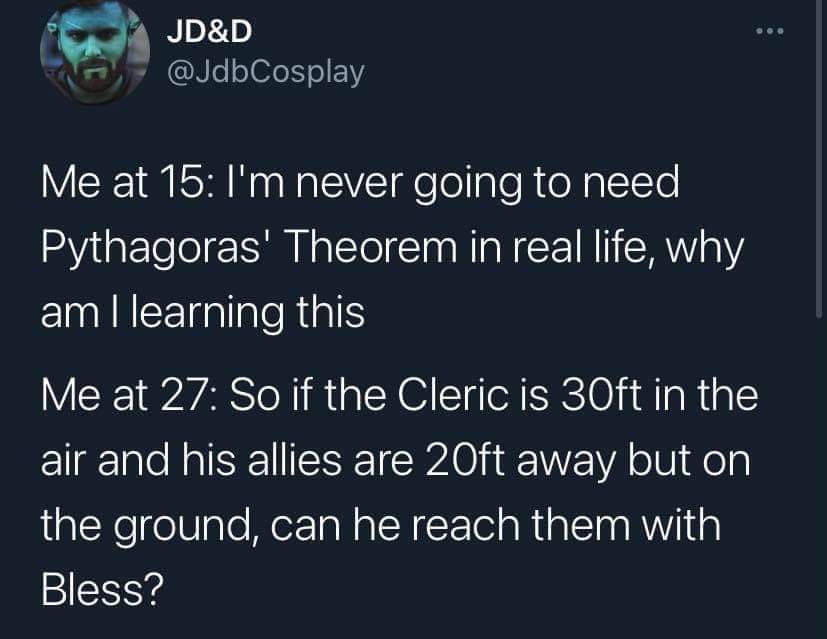this post was submitted on 30 Nov 2023
913 points (99.1% liked)
RPGMemes
10427 readers
85 users here now
Humor, jokes, memes about TTRPGs
founded 2 years ago
MODERATORS
you are viewing a single comment's thread
view the rest of the comments
view the rest of the comments

Ope. Hang on.
Normally this is obviously correct, but in this case, we have to consider how tall the characters are. As a DM, I would rule that if any part of the character (their actual person, not including, say, the reach of the sword they're holding) is within the 30' circle, or could be if they actively collaborated with the cleric using free actions, then the bless would affect them.
There's also a few definitions we need to talk about:
C ◻◻◻ Ain plane T, with 3 empty squares separating them. On a physical table, Carl would also probably be standing on a little platform or a d6 to indicate altitude.Based on some anthropometric data I found very quickly, the average human woman has a vertical reach of about 77 inches or 6' 5". That's naked, and she's probably wearing boots, let's add another inch for the soles so 6' 6".
We can give her a little bit more of an advantage as well; the shortest path between Alice and Carl is a straight line following the radius of the sphere, so she could "lean in" a bit with her arm to get closer. She can't go a full 45 degrees without falling prone though, so this only adds a little. Without a posable figure and a 3d model of the space in front of me I couldn't tell you how much she could reasonably add by pointing her body and hand at an angle, so let's just call it 2 more inches and keep measuring vertically.
We'll call the apex of her fingertips at 80 inches above T a new plane F, and A(F) is the point where she touches that plane with her fingers.
Now we get to actually apply the Pythagorean theorem. It's a triangle formed by the points (C(A) -> A(A) = 240") as leg 1 and (A(A) -> A(F) = 280") as leg 2. The hypotenuse, then, is 368 inches.
30ft is 360 inches. Is 80 inches of Alice enough to put a fingertip through any part of a 30ft sphere around Carl's feet?
No it isn't. So no +d4 for you Alice, piss off.
They did the Monster (Manual) Math!
But did you account for the angle of the terrain.
Man, I love internet nerds
What about the fact that any DnD universe is inherently functioning a set of non euclidean rules with respect to geometry? We know this because moving at a diagonal takes the same amount of movement as a square in one of the cardinal directions.